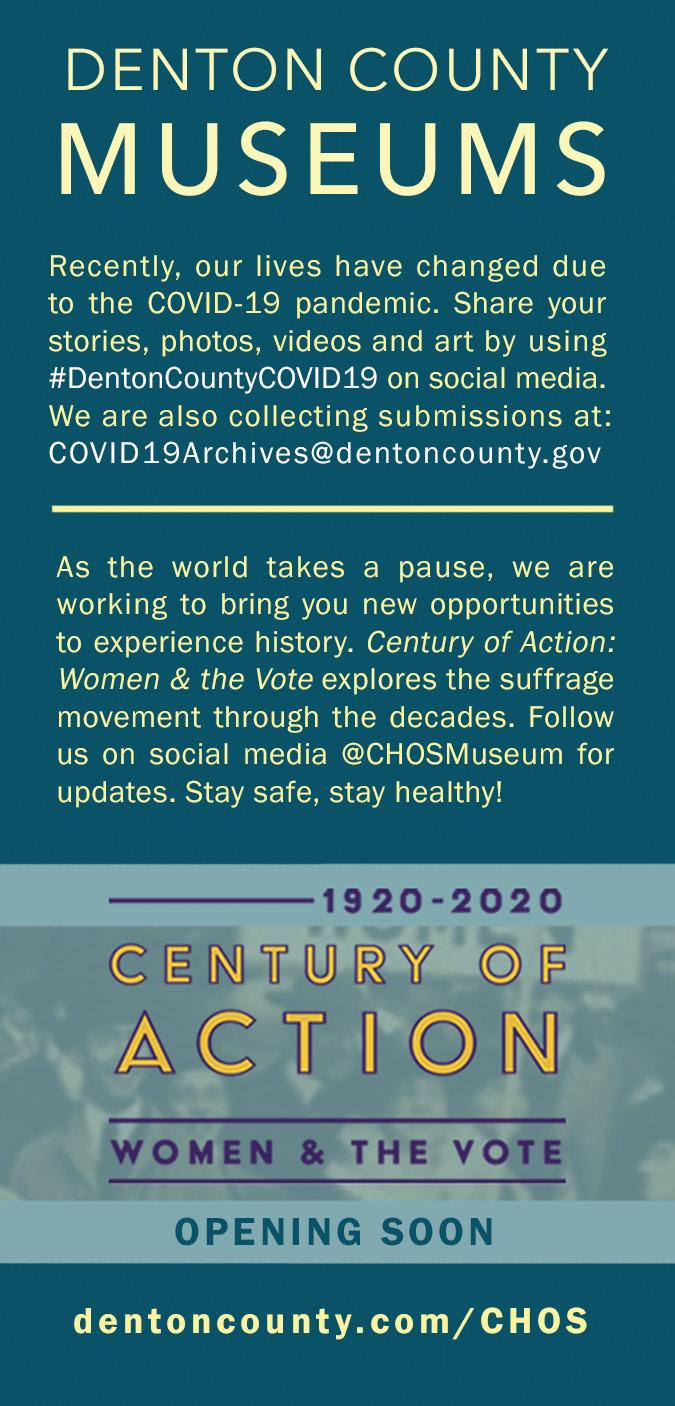
7 minute read
Bad Medicine?
from DFWChild May 2020
by DFWChild
noted.
the dark side (effects) of allergy medicine
Advertisement
BAD MEDICINE?
“M Y SON IS VERY CALM, he is very shy, and he’s not very quick to anger unless you’re his little sister,” jokes Brooke Reimer. “He’s just not the kind of kid who goes off the rails.”
Yet two years ago, when faced with an uncooperative Hot Wheels toy, 5-year-old Bryson pulled a Bruce Banner (that’s the mellow scientist who turns into the Hulk, for you moms not familiar with the superhero world). “He pushed over the Hot Wheels track and broke it,” Reimer remembers, “and he just started yelling and crying and screaming. I’d never seen him do that. It lasted like an hour or two.”
After that, four or five times a week, some tiny trigger would send mild-mannered Bryson into a rage, Reimer says. And between tantrums, he was mopey and sad. He just wasn’t himself.
“I remember asking him, ‘Why are you so angry?’” Reimer says. “And he just started crying,


warning” just means the cautionary text on the label is enclosed in a black box for emphasis. The goal is that patients and providers won’t ignore it like we do that part of every medication commercial when the narrator takes a soporific detour through the side effects.
Actually, the purported side effects of Singulair (or its unbranded name, montelukast) might catch your attention: anger, aggression, anxiety, depression, suicidal ideation. Since Singulair hit the market in 1998, the FDA’s Adverse Events Reporting System (FAERS) has received more than 4,400 reports of bad side effects in kids 17 and younger, including 81 deaths.
We need to put an asterisk by those numbers. The crowdsourced database likely contains misleading or redundant reports, while other incidents surely go unreported. Still, Dr. Lara Gross of Dallas Allergy and Asthma Center stresses that these bad experiences are rare.
“Although these are some scary side effects, they are uncommon, and overall it’s still a very safe medication,” she says.
Among the kids she treats, the most common side effect is vivid dreams, though she’s also stopped the drug when parents worried it was making their child more aggressive.
“It’s kind of inconclusive,” she explains. “Was it the Singulair? Was it something else? Some kids’ behaviors changed [after stopping the medication]; some didn’t. It’s so hard to quantify and there’s so many variables.”
So far, no studies have proven a causal and he said, ‘I don’t know. I’m just mad.’”
That was the tipping point for Reimer. She called Bryson’s Fort Worth allergist and said she wanted to take her son off Singulair, even though it was the first medication to successfully control his severe asthma symptoms, which seemed to be exacerbated by allergies.
“It was an allergy medication,” Reimer emphasizes. “It was supposed to stop the sniffles and the cough”— not alter his personality.
Bryson’s not the only kid to suffer side effects after starting treatment for allergies or asthma. This spring, the Food and Drug Administration issued a boxed warning (informally dubbed a “black box warning”) for Singulair thanks to an alarming collection of stories like Bryson’s.
We don’t know how, mechanically speaking, Singulair tampers with patients’ wiring, but we do know that not all allergy medications are as innocent as they seem. In fact, even over-thecounter Benadryl can mess with your mind, yet you probably have a bottle in your medicine cabinet right now.
Should you stop reading and purge your home of antihistamines, nasal sprays and Singulair tablets? Not necessarily—after all, no medication is 100% safe, and even the best allergy treatments carry a tiny dose of risk. But some of these unassuming drugs have more disturbing side effects than others.
THE SIDE OF CAUTION
Despite the ominous nickname, “black box
Allergic Reaction
If your child’s doctor recommends Singulair…
Do your homework. Make sure you understand the risks and the benefits so that you can make an informed decision. Remember that for most kids, the medication is safe, but talk about the side effects with your child’s doctor. Be sure to mention any existing mental health problems.
Ask about alternatives, especially if Singulair is
prescribed for allergies. The Food and Drug Administration’s new guidance says that patients should use Singulair for allergic rhinitis only if other allergy medications prove harmful or ineffective. Don’t give in to guilt. Whatever you decide, remember that you have your child’s best interests at heart. Try as you might, you can’t see the future.
If your child is already taking Singulair…
Talk to your child’s doctor. Discuss your concerns and ask about alternatives, especially if your child is taking Singulair for allergies. If your child is responding well to Singulair, you might choose to stay on the medication. Pay attention. Look for changes in your child’s behavior—for example, acting out or becoming more withdrawn. You know your child better than anyone; if something seems off, it probably is. Don’t quit without a Plan B. Before you stop the medication, consult your child’s doctor about next steps so that there are no gaps in your child’s treatment. Remember that the side effects might not go away immediately.

link between Singulair and those eyebrow-raising side effects. But the growing pile of reports, coupled with animal studies that suggest Singulair can act on brain cells, prompted the FDA to strengthen its warning. They feared that patients were making uninformed decisions because providers weren’t disclosing the risks.
“My pediatrician didn’t tell me, my allergist didn’t tell me—I told them,” confirms Reimer, who actually said no the first time Singulair was prescribed for her son. She had heard concerns about the drug at work; otherwise, she believes, she would’ve agreed to it readily. “You don’t think twice about allergy medicines.”
TRIED BUT NOT TRUE Case in point: the ubiquitous diphenhydramine, aka Benadryl.
It’s a first-generation antihistamine, able to sneak into the brain and influence the central nervous system, explains Dr. Dalia Galicia of Advanced Allergy and Asthma Associates in Fort Worth and Southlake. “It crosses the blood-brain barrier, and that’s why it has more side effects than the second-generation antihistamines, such as Claritin, Zyrtec, Allegra.”
While Benadryl’s sedative properties might save the day (or night) from time to time, that drowsiness does kids no favors in the classroom. In studies, kids taking Benadryl perform worse in school than those taking a second-gen antihistamine. Or a child might react to Benadryl like I did—by bouncing off the walls, which is also not conducive to success at school or home.
Galicia adds that it can be easier for kids to dangerously overdose on Benadryl than, say, Claritin, perhaps because the former is admin- istered every four to six hours rather than once or twice a day.
We’re still learning about the long-term effects of first-gen antihistamines too—recent research ties prolonged Benadryl use to dementia in older people.
Yet we still think of Benadryl as “the tried and true,” Gross says, adding that Benadryl does work faster than some alternatives. That’s not enough to tip the scales, in her opinion. “There are newer antihistamines that do not have those side effects and last longer, so there’s really no reason why I would start a child or an adult on Benadryl at this point.”
THE BEST MEDICINE
Not so with Singulair. Gross says that for many patients, it is unprob- lematic. “If a child’s asthma or allergies are well controlled on the medication, and they’re not having any side effects, there’s no need to stop it,” she states. Gross especially warns against quitting cold turkey without talking to your child’s doctor—your kiddo may need an alter- native medication to keep their symptoms at bay.
And while there are alternatives—antihistamines or nasal sprays for allergies, inhaled corticosteroids for asthma—Singulair has a unique mechanism that makes it the best option for some patients.
That was Reimer’s fear when she and her husband chose to take their son off his meds about a month into treatment.
“I was a CPS caseworker at the time,” she says, “so I was con- vinced that they were going to call me in for medical neglect.” She laughs about it now, embarrassed, but there was a real possibility that she was denying her child the only treatment capable of controlling his asthma.
Thankfully, Bryson’s new medication, an inhaled corticosteroid, has proven just as effective as Singulair. It took a few weeks for Bryson to fully emerge from his funk, but eventually the Reimers got their son back.
Reimer hopes the black box warning equips other parents to weigh the risks of starting or continuing Singulair—and empowers them to say no if they’re uncomfortable with the balance.
“I was scared to say no,” she admits. “I thought that they were just going to think I was a horrible, horrible mother who wasn’t looking out for her son’s best interests, when that’s what I was trying to do.”



